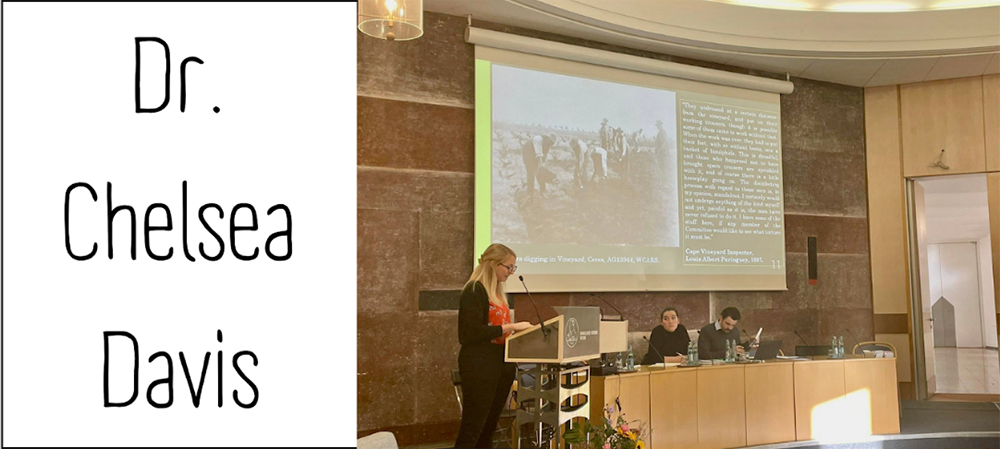On Oct. 31 the University of Maine history department held their second symposium talk, still following the theme of food in history. This talk was presented by Dr. Chelsea Davis, a lecturer of British History at Missouri State. Her talk titled “The Contradictions of ‘Civilizing’ Consumption: Colonial Wine in Britain’s Imperial Project” followed a chapter from her doctoral dissertation on the British imperial countries of South Africa and Australia integrating colonial wine into the global market.
Davis began her talk on the colonial wine market with a comparison between colonial wine to the finer European wines. The colonial wine market did not compare in revenue in the two countries to other goods that were produced in the area such as wheat and wool. Colonial wine was seen as an economic gamble. Davis’s thesis asked why there was pressure on the colonies for viticulture. She found that wine promoted colonial improvement and was universally accepted.
South Africa and Australia shared similar climate and growing conditions to that of southern European wine producers. South Africa produced the most wine while Australia was viewed as this ideal colony that was a slave-free, convict-free Christian colony. Roman antiquity fueled the idea of wine as culturally superior. Priests would spread the consumption of wine as well as bring wine grapes with them on their missions to inhibit the production of wine. French Huguenots would have a bible in one hand and a wine stalk in the other. As a result, wine was shaped as a good thing as it stemmed from diversity and Christianity.
“Culturally revered as an integral beverage by the Romans and Greeks, Britain subserved to this ideal,” Davis said.
Wine was not viewed as a hard liquor in England, unlike gin or whiskey. Wine was viewed as a table food and enjoyed by everyone. The English saw wine as a solution for social and moral improvement. Combined with an increase in print and publication, the benefits of wine spread through England and her colonies. Life was benefited by wine; it could even increase one’s social status.
“Characters of the people are analogous to their wines,” Davis said.
Davis mentions James Busby, an Australian wine producer who marketed wine to be a good thing, calling the wine vine a symbol of a happy land. Wine was used primarily as a medicinal tool, more specifically brandy wine But Davis found this civilizing tool to be riddled with contradictions when it came to the non-white population.
Wine directed toward the non-white population was used as a control tactic. It would be given to the aboriginals by colonists. If they spit the wine out, the colonists believed that these people rejected civilization. They would then turn these people into alcoholics. The Hottentot system was put in place in the Cape of Good Hope, South Africa., a system that planters would abuse. Instead of paying their workers in money, they would pay them in wine and have them drink their money away. It was a way of control and racist assumptions about the ethnic groups’ ability to consume wine. The planters could use their drunkenness as an excuse to abuse their workers, even though they supplied their workers with the wine. As a result, a new class formed: the drunk class.
“Colonial states actively made decisions on who should drink wine and what types. It was a tool of economic and social entrapment,” Davis said.
Influenced by this idea to improve civilization, the colonial wine industry was contaminated by contradictions that were ignored as the market grew in popularity in the world. South Africa is ranked No. 5 in wine production while Australia is No. 8. It’s once again another example of the dark side of globalization. The talk was incredibly informative about this niche topic that had influenced in more than one way the markets and the production of the world.
The next History Symposium Talk will not be a part of the food series, but will be held on Nov. 17 at 5 p.m. in Barrows Hall Hill Auditorium. It is called “The October 1943 Rescue of Jews from Denmark: Networks and Motives of the Rescuers” and is presented by Professor Therkel Stræde.
Be on the lookout for more history presentations on the UMaine History departments webpage.










